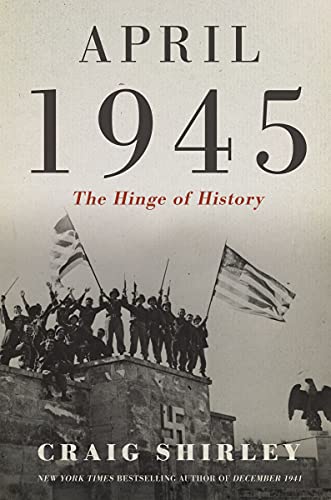Customer Services
Copyright © 2025 Desertcart Holdings Limited


Full description not available
T**S
Major Disappointment
This book is superficial beyond belief.The author claims that jet bombers bombed German cities continuously. There were a few jet fighters, but any jet bombers were insignificant. He implies that Ronald Reagan's service in World War II was equivalent to that of George H.W. Bush. (Not surprising, given that the author is also a Reagan biographer.)He also claimed that "thousands" of civilians were forced to tour the Buchenwald concentration camp after the way. It was more like one thousand.The language is stilted and trite, as in this example, "Now the crashing of guns from the decks of American and Japanese battleships was heard as often as the crashing of the blue Pacific Ocean on the shores of these small slices of Eden [Guam, Titian and Saipan]." Or, "Many young men sacrificed themselves on the altar of victory and freedom."A major factual error: He identifies George C. Marshall as "Secretary of the Army." He was Army Chief of Staff. I simply cannot trust the accuracy of this book. What kind of editor would allow for such carelessness? Maybe there was no editor.The sources are all secondary.If you are looking for a serious treatment of the significant month of April 1945, don't waste your time on this book.
K**K
Informative and detailed
Craig Shirley has done it again. I had a hard time putting down his December 1941 and now I found myself again going from cover to cover with April 1945.
B**E
A Disappointing Pastiche
Mr. Shirley is certainly correct in portraying April 1945 as a critical juncture in the course of World War II, and his previous book about December 1941 was a bestseller. However, one must approach this book understanding that it is an often oddly organized collection of both the significant and the trivial, with a few statistics thrown in but little in the way of analysis and the writing is so pedestrian as to be boring. No reader already familiar with the literature on America's involvement in World War II will find much of interest here. There are far superior studies of the American homefront, notably Richard Lingeman's "Don't You Know There's a War On?" (which covers the entire era 1941-45). Gregor Dallas's "1945: The War that Never Ended," which admittedly covers the entire year, is much more compelling reading, though much more coverage is given to Europe. The author's choice of what to devote coverage to is baffling. The crucial Yalta Conference gets only a few paragraphs, though FDR's death is well covered. Events are introduced, forgotten, abandoned, then returned to. There are a few factual errors which the copy editor should have caught, one being Speer's first name. The more egregious claim is that Japanese kamikaze pilots were sealed into their cockpits, which were booby-trapped to prevent any change of mind, a claim for which there is absolutely no evidence. Mr. Shirley's career is an intersting one, judging from the interior rear flap of the dust jacket, having written for both liberal newspapers and dubious ultra-right sources such as Newsmax and Breitbart. About half of the blurbs are from various rightwing figures, ranging from Newt Gingrich to Laura Ingraham. That in itself doesn't diminish this work, but one of the view reputable historians who has endorsed it is Jon Meachum. An unabashed conservative, Shirley deserves credit for an objective recounting of FDR's role in the war, even going far back into Roosevelt's pre-1932 history. According to the dust jacket, he is at work on a book about the Trump presidency to be titled "American Prometheus." Prometheus was, of course, the mythical figure who stole fire from the gods and suffered eternal punishment. Can't wait to see where he takes that one. This book will be enjoyed by those who have not read widely on America's role in World War II and desire to be informed in no particular thematic order as to events both monumental and trivial in the America of April 1945. Otherwise, spend your money elsewhere.
R**S
Rife with errors
This is a really sloppy job of story research.I couldn't finish it past the10% mark. Patrons 3rd Army was not surrounded at Bastogn - It was the101st Airborne division. And there are many other errors.
R**R
poorly written and sloppily researched
I agree with Barbara Turpin and R. Hoppes. The chapters go from one thing to another, so the story doesn't hang together. It also contains numerous historical errors. The one that really took the cake, and caused me to return the Kindle copy I had bought, was one concerning Claus von Stauffenberg's attempt to assassinate Hitler with a bomb in a briefcase. the author writes that Stauffenberg lost an arm and a leg during World War One. For his information, Stauffenberg lost an eye, a hand, and two fingers on is other hand several months before the attempted assassination. Also, Stauffenberg was 36 years old at the time, meaning he could hardly have been in World War One. A good editor would have spotted this error at once.
A**T
Terrific telling of history.
Craig Shirley's tome, April 1945, is a terrific bookend to his other magnificent history of World War II, December 1941, and telling the narrative of the war from those who endured it stateside, the information they learned, the textures of the moment, and how it changed the country and the world. Absolutely terrific, highly recommended for that person you know looking for a fresh angle on the end of that war. And, perhaps unfortunately, it's all too prescient, too.
Trustpilot
2 weeks ago
1 month ago